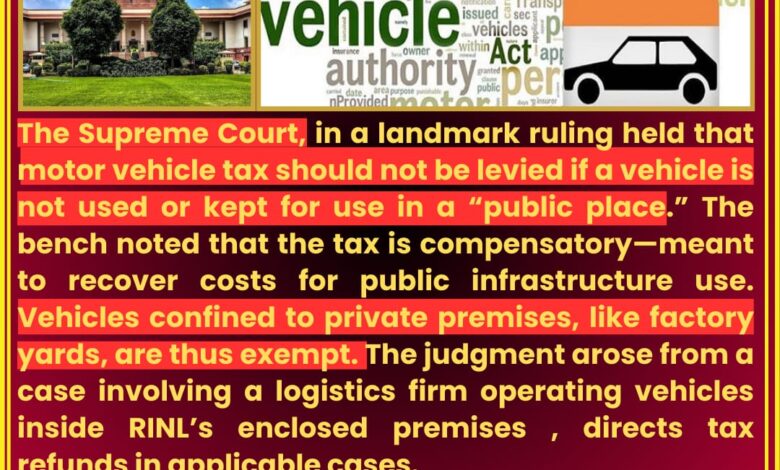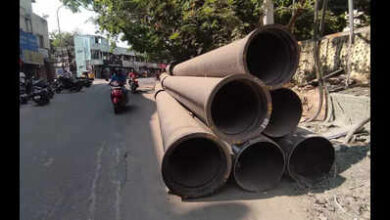
1. Key Judgment Details
On August 29, 2025, a two-judge bench of the Supreme Court comprising Justice Manoj Misra and Justice Ujjal Bhuyan held that the motor vehicle tax is compensatory—levied to recuperate costs of public infrastructure usage like roads and highways. If a vehicle is not used or kept for use in a public place, then the owner is not drawing benefit from public infrastructure and should not be burdened with the tax. This verdict upheld the Andhra Pradesh High Court’s direction to refund tax paid under protest. VerdictumTelegraph India
2. Case Background
The case, M/s Tarachand Logistic Solutions Ltd. v. State of Andhra Pradesh, involved vehicles deployed strictly within the Rashtriya Ispat Nigam Limited (RINL) premises—an enclosed, restricted area not accessible to the public. The logistics firm argued that since the vehicles were not using any public roads, they should not be subject to the motor vehicle tax under Section 3 of the Andhra Pradesh Motor Vehicle Taxation Act, 1963. Telegraph IndiaVerdictum
3. Supreme Court’s Legal Reasoning
The bench explained that the tax is levied only when a vehicle is actually used in, or kept for use in, a public place. The use of the term “public place” in the statute implies vehicles confined to private, closed areas cannot be taxed. Therefore, since the Metro’s vehicles operated solely within RINL’s private premises, no tax liability should arise for that period. Telegraph IndiaVerdictum
4. Supporting Precedents
-
In The Automobile Transport (Rajasthan) Ltd. v. State of Rajasthan (1962), the SC had ruled that the tax is compensatory, not a tax on ownership, and thus tied to road use. DigiScr
-
In State of Karnataka v. K. Gopalakrishna Shenoy (1987), the Court reaffirmed the compensatory nature of the tax, applicable to vehicles kept within the state unless properly exempted. Indian Kanoon
-
Other rulings noted that vehicles not intended to be used in the state or in public roads, when appropriately declared, may qualify for tax exemption, subject to fulfilling statutory procedures such as declaration of non-use. Indian KanoonCaseMine
5. What This Means for Vehicle Owners
Owners whose vehicles operate exclusively on private premises—like within factory or industrial compound boundaries—can now seek relief from motor vehicle tax. The judgment supports refund claims for tax previously paid under protest for such scenarios.
6. Caveats and Procedural Requirements
Tax exemption relief hinges on precise compliance with applicable laws. Certain statutes within states allow relief via formal declarations or surrender of registration certificates to establish non-use in public places. This highlights the importance of clear documentation and procedural compliance. Indian Kanoon+1
7. Broader Implications
The verdict underscores principles of fairness in taxation—highlighting how taxing entities should only levy compensatory fees aligned with usage. It may prompt various industries with captive fleets to reassess their tax liabilities, potentially influencing state policies to refine exemption protocols.
Conclusion
The Supreme Court’s August 29, 2025 ruling reaffirms that motor vehicle tax is not a blanket levy but context-specific—applicable only when vehicles utilize public infrastructure. Vehicles operating solely within enclosed zones like private factories are exempt. The judgment brings clarity to compensatory tax jurisprudence and offers relief to affected vehicle owners across India.









